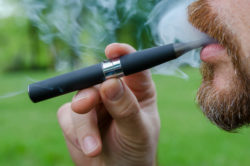Top Class Actions’s website and social media posts use affiliate links. If you make a purchase using such links, we may receive a commission, but it will not result in any additional charges to you. Please review our Affiliate Link Disclosure for more information.

What is nicotine?
Nicotine is naturally produced by nightshade plants, a group that includes vegetables such as potatoes, tomatoes, and eggplant. This chemical is a natural stimulant and is highly addictive. When individuals begin to smoke cigarettes, they can quickly become addicted to nicotine. This addiction is often the hardest part of quitting cigarettes and why some turn to e-cigarettes.
Nicotine is often included in smoking cessation products such as gum and patches. These products aim to satisfy an individual’s addiction to nicotine without needing to smoke harmful cigarettes.
What are e-cigarettes?
Electronic cigarettes, referred to as e-cigarettes, are devices that vaporize nicotine fluid. This vapor is inhaled and, similar to smoking cigarettes, gives a rush of nicotine. These devices are commonly used by individuals who are attempting to quit cigarettes. The nicotine vapor is considered to be safer and less harmful than the carcinogens found in traditional cigarettes.
More recently, e-cigarettes have become a cultural phenomenon among young individuals. Brands such as JUUL offer enticing flavors which attract younger consumers. This marketing strategy has been repeatedly criticized for needlessly getting youth addicted to nicotine.
What is Nicotine Poisoning?
Nicotine is what makes cigarettes and tobacco products so enticing and addicting for users. Many people don’t know much about nicotine poisoning, but it can be a dangerous situation. A person who knows the signs and can get quick care could minimize the impacts of nicotine poisoning. However, someone new to using nicotine, like a teen who is using an e-cigarette, might not be able to spot the symptoms quickly enough to coordinate a clear response and get medical help.
When medical help is not obtained immediately for nicotine poisoning, then the impacts could be severe and long-lasting. According to the CDC, a deadly dose of nicotine for an adult is 50 to 60 milligrams of nicotine. Most people are unlikely to overdose on nicotine just from cigarettes or a nicotine patch.
In recent years, vaping pens have come on the market as a nicotine alternative. One of the dangers of this is if the dose of nicotine from these devices is much higher than what is typical for cigarettes. Even more dangerous is the possibility that a user could accidentally swallow the nicotine-filled fluid contained in an e-cigarette. Teens and new users might not realize that certain vape pens have so much nicotine, presenting the possibility for side effects like seizures and nicotine poisoning.
Symptoms of nicotine poisoning can happen within an hour or two after consumption, but can continue for up to 24 hours later. Anyone who begins to feel poorly after using an e-cigarette should monitor their condition closely.
Can nicotine from e-cigarettes cause seizures?
Nicotine-induced seizures have been recorded in medical literature, and the effect of the addictive chemical has been thoroughly studied in animal trials. A 2017 study concluded that nicotine directly caused seizures when it was injected into the amygdala.
“Microinjections of nicotine into the amygdala evoked convulsive seizures in a dose-related manner. The present results strongly suggest that nicotine elicits convulsive seizures by activating amygdalar neurons,” the animal study concluded.
More recently, the chemical has been linked to seizures in humans. The U.S. Food and Drug Administration (FDA) recently reported that it had received 35 reports of seizures between 2010 and 2019 that were related to vaping. Most of these cases reportedly affected “youth or young adult users.”
Peter Chai, a medical toxicologist at Brigham and Women’s Hospital, told The Verge that it’s “well-nigh impossible” to get enough nicotine to cause seizures when smoking traditional cigarettes. However, this may not be the case with vaping e-cigarettes.
“I think exposure (skin contact or oral) in children, or vaping exposure in younger individuals (adolescents through which we’ve seen a large increase in e-cig use), might be accounting or the increase in these seizures,” Chai told The Verge in an email.
What does the FDA say?
The FDA notes that only 35 incidents over the span of 9 years are not enough for them to make a definite conclusion. However, they acknowledge that there could have been numerous other cases that were not reported through their Safety Reporting Portal.
“While 35 cases may not seem like much compared to the total number of people using e-cigarettes, we are nonetheless concerned by these reported cases,” said FDA Commissioner Scott Gottlieb in a statement.
The FDA will reportedly investigate the issue more thoroughly, but released a safety announcement to inform the public about the issue and their plans.
Join a Free JUUL E-Cigarette Class Action Lawsuit Investigation
If you or your child suffered seizures after vaping with a JUUL e-cigarette, you may benefit from participating in a free JUUL class action lawsuit investigation.
This article is not legal advice. It is presented
for informational purposes only.
ATTORNEY ADVERTISING
Top Class Actions is a Proud Member of the American Bar Association
LEGAL INFORMATION IS NOT LEGAL ADVICE
Top Class Actions Legal Statement
©2008 – 2024 Top Class Actions® LLC
Various Trademarks held by their respective owners
This website is not intended for viewing or usage by European Union citizens.
Get Help – It’s Free
Join a Free JUUL E-Cigarette Class Action Lawsuit Investigation
If you qualify, an attorney will contact you to discuss the details of your potential case at no charge to you.
PLEASE NOTE: If you want to participate in this investigation, it is imperative that you reply to the law firm if they call or email you. Failing to do so may result in you not getting signed up as a client or getting you dropped as a client.
E-mail any problems with this form to:
Questions@TopClassActions.com.












